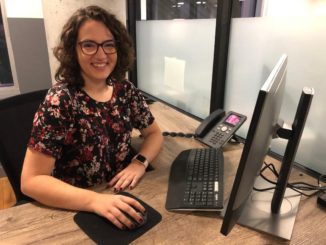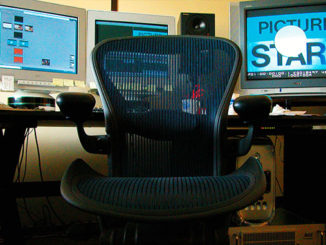
by Yoni Rusnak
Each of our collective origin stories began with a singular decision, finding success in one of the most competitive job markets in the world: Hollywood. Your own personal journey might have started in high school A/V club, college or even later in life with the decision to change careers. From there, you found your way into the industry – cutting digital content for YouTube, night assisting on a reality show or PA’ing a scripted series.
For most of us, though, working in features is the end goal. My own pursuit of features began with five years in reality television, developing all the skills I thought I needed, only to realize I was missing one more that is vital to success: networking.
After moving to Los Angeles and making the decision to transition into scripted content, it dawned on me that I had zero connections in the scripted world. I quickly realized that if I wanted to succeed in an area of the industry that doesn’t advertise job openings, waiting for a position to fall into my lap wasn’t going to be the most effective strategy. Instead, I chose to actively seek out opportunities. Since then, I’ve been on a personal journey spanning two years, learning everything I can about effectively building a professional network. Networking isn’t a skill taught in school or the professional work environment, but it is crucial for anyone looking to succeed in this business. So if you are on the same journey, then you need to learn about the various ways that can support networking, for instance, you may want to look into how LinkedIn automation software and Facebook management tools, for example, can help with your social media standing and get you connected in the way that you need.
Additionally, living in a city like LA and San Francisco can also bring more networking prospects. It might be important to use every opportunity a big city could offer to gain the uplift required in achieving your dreams. Also, if you are exploring the idea of moving to San Francisco, you might want to learn what the city has to offer to you, like lifestyle, art and culture, real estate, job opportunities, etc. You might consider checking some blogs or websites like https://sanfranciscopremierhomes.com/.
My own pursuit of features began with five years in reality television, developing all the skills I thought I needed, only to realize I was missing one more that is vital to success: networking.
What follows is a set of networking guidelines I’ve used in my own career to maneuver from reality to scripted television, and again from television to features. Hopefully it can be useful to anyone out there looking to develop his or her own network state of mind.

Where to Start
It was a perfect spring morning. I was sitting at a Starbucks in Burbank chatting with a scripted assistant editor who I’d met through an industry Facebook group. We were roughly 30 minutes into our conversation when she offered me a piece of advice that changed my career forever: “If you want to work in scripted television, just start reaching out to people who work on shows you like.” I took a moment to ponder her wisdom, then replied, “But whom should I contact?”
That is the vital first question when thinking about networking because it has a huge impact on how effective your strategy will be. For assistant editing, the most common advice I’ve received is to reach out to editors, post producers and post supervisors. This make sense because those are the people either hiring or in a position to influence the person hiring. However, on closer inspection, this advice can be somewhat limiting.
On Tim Ferriss’ podcast (tim.blog/podcast/, episode #99), he tells listeners (I’m paraphrasing): “You’re far more likely to receive a response to an e-mail from the 10th most recognizable person in a field than you are from the first, because fewer people are contacting them [sic].” It’s harder to get in touch with Steven Spielberg than your favorite indie director because the former is more visible. Your attempts get lost in the noise and you’re quickly met with the networking equivalent of tumbleweeds. I decided to heed Tim’s advice and took a different approach. Instead of contacting the usual suspects, I began reaching out to assistant editors and post coordinators. This proved highly effective for a number of reasons.
First, it made the assistants and posts coordinators feel important. We all crave validation. The work done by these positions is vital to their respective projects; however, the spotlight is rarely upon them. Asking to hear their stories will often be more flattering than reaching out to editors because it’s not as expected.
Second, while editors and post producers are usually only looking to fill positions for shows on which they’re currently working, assistants are constantly contacted about jobs. Working assistant editors typically know of more job openings.
It’s harder to get in touch with Steven Spielberg than your favorite indie director because the former is more visible.
Finally, through developing relationships with assistant editors or post coordinators, you’re able to have them personally recommend to their editors or producers that they take your meeting, helping to cut through the noise of cold e-mails.
My own scripted journey began at a coffee meeting with a post coordinator. She admitted during our initial correspondence that she wasn’t in a position to offer me any useful advice, but I persisted and asked to meet anyway. During our meeting, she reaffirmed her inability to help me, but offered instead to connect me with some assistant editors with whom she has worked.
I subsequently met with one of those assistants and during our meeting she ran into an industry colleague. While the two of them caught up, I began talking to the colleague’s friend – who turned out to be a scripted editor – and she offered to let me assist her (for free) on a short film in return for teaching me about scripted assisting. After a few weeks of our working together, a position opened on a show on which she had previously worked. She happily recommended me for the position because we had worked together and she could personally vouch for my abilities.
Even though the events that lead to my first scripted opportunity were born of a chance encounter, that encounter was only made possible because I reached out to the post coordinator – a position no one had advised me to contact. This taught me a valuable lesson about the question of who to contact. The answer: everyone working in the environment in which you are interested, no matter his or her title. You never know where opportunity will manifest itself.

Constructing Effective Correspondence
There are two approaches when constructing an unsolicited e-mail. The first is writing a long e-mail describing your personal journey in hopes of generating empathy. The second is a short e-mail expressing that you’d appreciate the opportunity to sit down and chat with them about their experiences. While there’s no right or wrong approach, I’ve found the second option to be more successful. Why? Because it’s about the other person. Showing an interest in others will typically be more captivating than volunteering personal information.
With that in mind, here are a few guidelines I follow when constructing my correspondence:
Common points of reference. I begin each correspondence explaining that I’m a fellow post professional and that I’m from Australia. Trying to identify shared experiences will hopefully make the recipient more receptive to your e-mail. Recently, I contacted an assistant editor who has worked on some of my favorite blockbusters. To my delight, he responded, “Perfect timing! My next project is being shot in Australia and I’d love to get together. Perhaps we can help each other and you can fill me in on what I should expect over there.”
Appreciation. Early on in each e-mail, I express my appreciation that the recipient is even taking the time to read it. I explain that if no further action is taken, I fully understand and am thankful regardless (Tim Ferriss’ podcast, episode #241). It’s important to understand that the people you are contacting aren’t obligated to read your e-mail. Letting them know upfront that you don’t have any expectations of them can soften the natural defense mechanism people have to unsolicited requests for help, time or attention.
Trying to identify shared experiences will hopefully make the recipient more receptive to your e-mail.
Acknowledge their experience. It’s important to personalize each e-mail so the recipient knows you’re not copying and pasting the same message to everyone you can find.
Call to action. I state a specific time frame for the meeting to take place and ask for just 30 minutes (it may go longer but, again, you’re trying to alleviate any pressure to commit to more than with what she or he is comfortable). An example might be to offer to buy the coffee at a time and place of the recipient’s choosing sometime in the following two weeks.
The ultimate goal with each e-mail is to ask for the least upfront commitment while showing gratitude, and allowing the person to take whatever level of action is most comfortable.

Initial Contact
Meeting for the purpose of networking can be incredibly forced and, for most, doesn’t come naturally. My first networking experience was a phone call with an assistant editor who works on studio tentpole films. I was unsure of what to say, how to act or how to feel, and spent the entire conversation sweating profusely while pacing around my apartment. I wanted so badly to be offered a job in that moment that instead of listening to the substance of what he was telling me, I simply scanned the conversation for any opportunity to offer my services.
The end result was a very awkward phone call and zero future correspondence. Over the next few months, I continued to make phone calls, take meetings and send e-mails. With each interaction, I learned something new about the subtle art of building professional relationships.
Seek out friends, not job opportunities. Early in my networking, I approached each meeting as a job opportunity to be seized upon in that moment. This mode of thinking caused me to come across as overly aggressive and desperate. If you’ve gotten to the stage where people have agreed to meet, then they already know you’re looking for work. There is no need to steer the conversation in that direction. Instead, treat the meeting like you would any other human interaction and get to know them on a personal level.
Additionally, I observed that although everybody was extremely generous with their time, I naturally connected with some more than others. Armed with this realization, I continued to reach out to everyone from whom I could learn, but then focused my attention on finding those people with whom I genuinely connected, and developing those relationships.
With each interaction, I learned something new about the subtle art of building professional relationships.
Stay in touch. Not every person you contact is going to offer more than a single meeting or phone call. Similarly, not everyone you meet will you want to see again. For those interactions you deem successful, or sense there is a connection, it’s important to follow up and maintain the relationship. Over the course of my networking, I’ve become close with several people. Some have even become my closest friends.
Subsequently, those same people have gone on to personally recommend me for jobs, even though we’ve never worked together. One of those recommendations actually landed me my first feature. So, while initial meetings might not instantly lead to opportunities, follow-up interactions can.
As is true in life, we each uniquely gravitate toward certain personality types. Networking is about consistently reaching out and finding those in the industry whose personalities are in line with our own.

Ultimately, finding one’s place in Hollywood is an incredibly challenging endeavor. Your specific circumstance may make it easy to focus on how unfair the industry can be, or how lucky others are because they happened to be in the right place at the right time. It’s undeniable that luck is a factor in how all of our opportunities come about. However, a big part of luck is opportunity, and networking is about just that: creating opportunity.
Networking is a skill, and like any other skill, it takes persistence and practice. It won’t always go according to plan, but learning how to engage with others on a professional level and becoming comfortable with meeting like-minded people is the best investment we can all make in our film careers.





